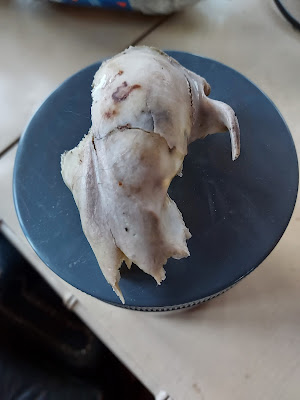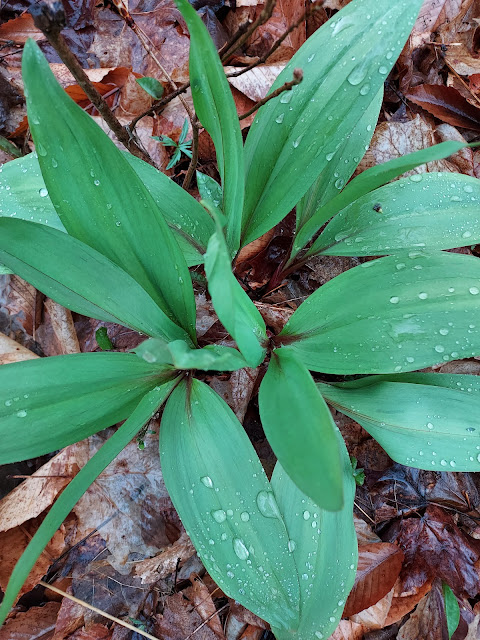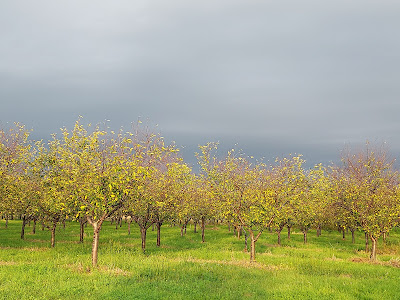Sunny and a plethora of leeks
Lame Excuses
In the past two or three weeks, I have begun and discarded at least four posts for Books in Northport. Titles were: Tough Tourism; The House That Had Everything; “You Should Write a Book”; and Where do I want to go? Abandoned, all of them (though the draft beginnings still reside on my laptop desktop), and I know such finicky self-judgment is probably misplaced, as the nearly formless meanderings I occasionally throw out into the world, posts without any central theme or narrative thread, are often more popular and gain more comments than others I labor over to achieve a “finished” feel.
 |
| Leaves of dogtooth violet, a.k.a. trout lily |
Ah, but then someone visiting my bookstore says, “I always read your blog,” and a note from a friend (received two days after a post finally went up) mentions that she has been looking in vain on Books in Northport for something new, and I know it’s time to kick-start my online presence. You don’t have to be “in the mood” – or inspired – to write! You just sit down and do it! And in the case of a blog, call a draft post good enough and hit that publish button!
 |
| Random Fungus (until someone identifies it for me) |
Outdoors
Beginning with Sunny Juliet never hurts (see again opening image), because most people love dog stories or photos, my girl is lively and photogenic, and we get outdoors a couple times every day. Even in this morning’s light rain, we were out for a good hour, and as usual there was so much going on (every day at this time of year bringing signs of new life) that I was pulling my phone out of my pocket over and over to photograph my finds. The rain had decided me against taking the camera, but by Saturday, or Sunday for sure, the sun will be shining and those spring beauties – all over the woods! -- will have opened their petals to the light.
 |
| Spring beauties are biding their time. |
Plentiful though the wild leeks are, I never harvest them for my kitchen. If you do, never take more than 5% of a patch, and try to harvest where no one else has taken plants before. That will leave enough for coming years, as leeks are slow to mature and proliferate.
We all have different tastes, in food as well as in books. Toothwort, now, is a different story for me, and I look forward to those peppery-spicy leaves and flowers in spring salads very soon.
Everything is beautiful in its own way, isn't it?
 |
| That fungus close up looks almost like a rose. |
In the Bookstore
Thursday, between customers (all from out of town and all gratifyingly appreciative), I worked with the advertising department at the Leelanau Enterprise on an ad to run in next week’s paper. Since Monday, April 22, is Earth Day 2024, I’ll depart from my usual schedule and have the bookstore open that day – if I’m lucky, with my beautiful new canvas book bags to sell, in keeping with Earth Day’s theme this year, “Planet vs. Plastics.” My regular customers know by now that any plastic bags I put their purchases in have been donated for re-use by other customers, but we really do need to eliminate plastics from our lives wherever possible, in the Great Lakes and across the nation. Agree?
And there will be, as there are just about every week, new books and “new” used book additions to store stock. As for me, I’ve been reading a lot of books set in the West lately, books full of mountains and dry washes, scarce water and hard living. I also made my way through a new memoir – what I call a “grief memoir – by Amy Lin called Here After. Although her husband was so much younger when he died than was mine, there was much that resonated with me in her experience. This, for instance:
We shared a language that was all our own. I am now the last speaker of it.
- Amy Lin, Here After
What must it be like for older adults who have to leave a country they've known all their lives and go to make a new life in a strange land with a whole new language? I am blessed to be able to remain in familiar and beloved surroundings.
Finally, Sunny's Mystery Treasure
 |
| Smaller than my hand... |


























